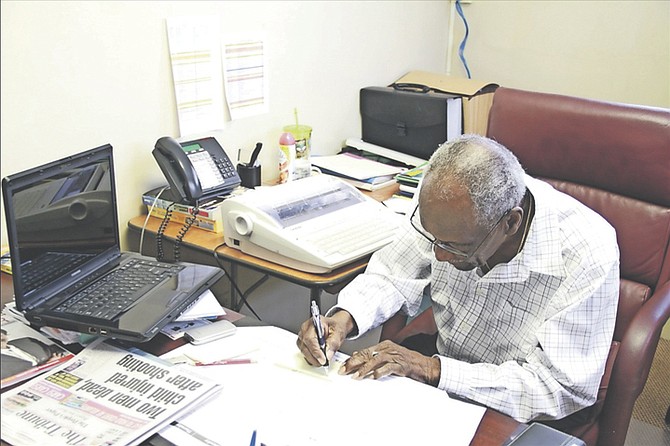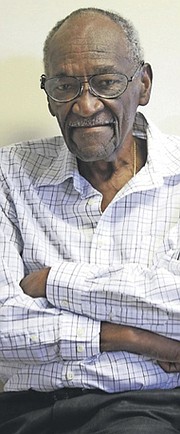Paul Thompson came to the Bahamas in 1951 and remains optimistic the issues of crime plaguing the country today can be solved. Photo: Tim Clarke
Based on his 30 years experience as a police officer Paul Thompson begins a series looking at why the Bahamas is in the state it is today and what lessons should have been learned . . .
Paul Thompson is the quintessential policeman. His career spanned the modern development of the Bahamas - from colonial times to the challenges of nationhood.
Born in a small farming village in Trinidad, he was recruited by the Royal Bahamas Police Force in 1951. He spent most of his time on the force in the Criminal Investigation Department, retiring in 1981 as an Assistant Commissioner.
He then began a second career as head of security for the Paradise Island Resort & Casino, returning to the police force as a civilian training officer in 1998, and in 2002 was appointed general manager of Wemco Security.
Five years later he set up his own security company - Paul Thompson & Associates. Now in his 80s, he remains active in security work.
This year I will celebrate my 87th birthday and my 65th year in the Commonwealth of the Bahamas - a great country that captured my love and devotion from the moment I arrived on Easter Monday in 1951.
I was impressed by the friendliness of the Bahamian people as well as by the order and discipline of the society. But what struck me the most was the clean environment throughout the island of New Providence. The words litter and trash were hardly ever uttered, derelict cars did not exist, and the inner city areas ‘over-the-hill’ were well-groomed, with flowers in the yards.
It was my first experience of the sun, sand and sea that I had learned about in geography lessons at Canupia Government School back in Trinidad. After I was recruited by Augustus ‘Gussie’ Roberts, the Royal Bahamas Police Force (RBPF) became my family and my university. Over the years I made firm friends and benefitted from great mentors, who guided me in my career - most of which was spent in the Criminal Investigation Department (CID).
It was my good fortune to be surrounded by fine men like Wenzel Grainger, Albert Miller, Salathial Thompson, Courtney Strachan and Stanley Moir, among others. I travelled to almost every Family Island to conduct police investigations, and was able to make many more friends in the process.
By dint of hard work and enthusiasm I was given early promotions and dispatched to advanced training courses in England, Scotland, France and the United States. The West Riding Detective School in Yorkshire was particularly important to my professional development. And those of us who were sent abroad returned with lots of new ideas and techniques to improve police work in the Bahamas.
Prior to independence in 1973 the RBPF was commanded mostly by British officers. Frank Russell, the head of the CID in the 1950s, came to us from the London Metropolitan Police. Stanley Moir came here in 1956 from the Bermuda Police Service and headed up CID in the 1960s. It wasn’t until June, 1973, that a Bahamian was appointed Commissioner of Police. That Bahamian was Salathial Thompson, who died in 2002.
When I became a divisional officer, I took part in annual meetings when senior officers reported on crime in society and conditions in their units. We made recommendations on manpower, training and equipment, but we would also discuss new laws, changes to existing laws, improvements to the overall administration of justice, and anything related to the maintenance of law and order in the Bahamas.
Over the next several weeks, The Tribune has kindly given me the opportunity to review some of these important proposals in print.
In my view, if these recommendations had been given serious consideration in the 1960s and 70s, the Bahamas would be in a much better place today. We made proposals on the environment, on overcrowding and rehabilitation in the prison system, on illegal immigration, on crime and punishment, and on the failure to seize the proceeds of criminal activities, among other matters.
Throughout the 1950s, 60s and into the 70s the local entertainment industry thrived in Nassau and attracted thousands of visitors and residents to nightclubs ‘over-the-hill’. We could walk to these venues without fear. Courtesy and good service were natural, but over time we have allowed this country to degenerate into its present sad state.
The lyrics of a calypso by the Mighty Sparrow might help to put this situation in perspective:
“Once upon a time this country was sweet
People could lime freely on the street
Whether was north or south you coulda always walk
Without the fear of molestation and intimidation.
“Something happen along the way, now honesty was simply thrown overboard.
This is madness, madness, total madness.
“What’s going on in our country, Lord?
Tell me what is wrong, I want to know.
The disrespect, the contempt,
Decent people cannot cope
Even the judiciary losing hope,
In the battle against crime and dope.
This is madness, this is madness.”
It is love for my adopted country, which has been home to me for the past 65 years, that encourages me to write and talk about these issues as long as I draw breath.
We can solve our problems if we make the effort and work together. I have no other motives. Both Free National Movement and Progressive Liberal Party administrations have received the advice of senior police officers and others over the years without acting on that advice.
Many of these ideas and proposals remain relevant today and could still be implemented in some cases. But I have learned over the course of my career that governments prefer to listen to the advice of highly-paid foreign consultants rather than local experts.
At the end of this series of articles, I plan to combine them into a small book. This will be my second book. The first - ‘A Policeman’s Story’ - was published by Media Enterprises in 2013. It tells about my career and recounts some of the more interesting cases I worked on as a CID detective. I hope that my second book will round out whatever legacy I may have the honour of leaving behind.
NEXT WEEK: how the Bahamas and RBDF made me a man.
Comments and
responses to
insight@tribunemedia.net






Comments
Gotoutintime 9 years, 5 months ago
Mr. Thompson was and is a great man---I look forward to his future articles!
Sign in to comment
OpenID